How children are being affected by long Covid
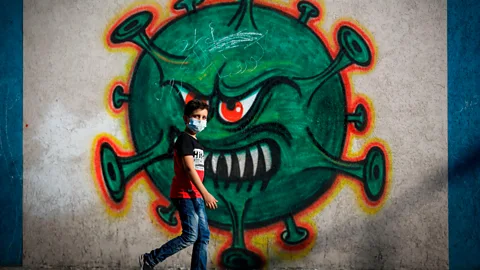 Mohammed Abed/Getty Images
Mohammed Abed/Getty ImagesWhile Covid-19 causes relatively mild disease in most children, previously healthy youngsters are showing signs of longer-term issues related to the virus.
Before they fell ill, the children being seen by Danilo Buonsenso at the Gemelli University Hospital in Rome, Italy, had been lively and active. Most played sports and took part in activities after school. But then they caught Covid-19.
Months after they had apparently recovered from the initial viral infection, the children continued to struggle with a wide range of symptoms that left them unable to return to their normal lives.
"Most of the children I've seen were completely healthy before Covid, they were doing sport, extra-school activities," says Buonsenso. "And then they were not able to return to their normal school routine because they were getting headaches or had difficulty concentrating after a few hours."
A paediatrician at the Gemelli University Hospital, Buonsenso was the first doctor to survey whether children were vulnerable to long Covid. Like many paediatricians, he has seen children with lingering symptoms of fatigue, insomnia, joint pain, respiratory issues, skin rashes and heart palpitations, which can remain months after the infection has passed.
Buonsenso says it is vital that children are not left behind in studies of post-Covid illness. He points out that just as in adults, even children who are asymptomatic or mildly infected can develop persistent problems.
Children have generally been thought to be less vulnerable to the longer-term effects of Covid-19, with the risk decreasing the younger they are. It was thought this might be because younger children do not have as many ACE2 receptors – the keyhole the virus targets to invade our cells in their nose and respiratory tract.
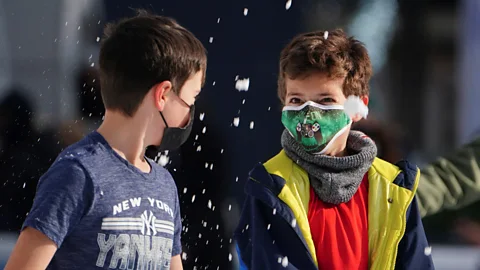 Reuters/Carlo Allegri
Reuters/Carlo AllegriHowever, the emergence of the Omicron variant – which is more infectious than previous forms of Covid-19 – and its new subvariant BA.2, has now led to a much higher proportion of children becoming infected with the virus.
According to a report from the Centers for Disease Control and Prevention in the US, Covid-19 hospital admission rates among children and adolescents under the age of 17 increased rapidly in late December 2021, as the Omicron variant began to take off. This was particularly notable among children aged 0-4 years who were not yet eligible for vaccination.
Similar findings have been reported in the UK, with reports in early February 2022 noting there has been an increase in the proportion of children admitted to hospital with Covid-19 during the Omicron wave, especially those under the age of one.
While the vast majority of children recover quickly, specialists are still concerned about early signs which indicate that the rates of those with long Covid could be rising.
"We are currently seeing an uptick in the number of children being diagnosed with post-Covid conditions," says Carlos Oliveira, a paediatrician who runs the post-Covid care program at Yale New Haven Children's Hospital, in Connecticut, US. "In our hospital for example, the number of children and adolescents who were diagnosed with a post-Covid condition this month [January] is already more than three times higher than what we experienced in the summer months. Other countries are seeing similar trends."
This is backed up by the latest data from the UK's Office of National Statistics which found that the number of children under 16 with self-reported Long Covid of any duration 'increased from 77,000 in October 2021, to 119,000 in January 2022.
To deal with this steadily rising influx of patients, the UK has now established 15 specialist paediatric hubs designed to provide post-Covid care, while the US and many other countries are making similar investments. The Children's Hospital Los Angeles has been awarded an $8.3m grant (£6.2m) specifically to study Long Covid in children and young adults, as part of a national initiative called Recover which aims to unlock the mysteries surrounding the aftermath of Covid-19 infection.
The apparently heightened risk of long Covid in children has also been used as an argument to vaccinate more children against the disease. Studies in adults have suggested Covid-19 vaccination is associated with a lower risk of developing long Covid symptoms. However, while the UK, US and many other European countries such as France and Spain, are now vaccinating 5-to-11-year-olds, vaccines are still awaiting authorisation for use in children under five.
But one of the major questions remains trying to figure out just how common long Covid is in children. Scientists at University College London recently unveiled the first standardised definition of the condition – symptoms which impact childrens’ physical, mental or social wellbeing and persist for a minimum of 12 weeks after initial Covid-19 testing. It is hoped that this will make it easier for researchers to study the disease course, its various outcomes, and understand precisely how many children are affected by it.
Last September, researchers at University College London and Public Health England unearthed some of the first concrete answers after surveying 3,065 11-to-17-year-olds who tested positive for Covid between January and March.
Somewhere between 2% and 14% of teenagers were found to still experience fatigue, shortness of breath and persistent headache, 15 weeks after reporting a positive PCR test, and at a higher rate than a control group who tested negative for the virus. Around the same time, the Israeli Health Ministry released a survey showing that 11.2% of children reported some symptoms of long Covid as part of their recovery, and 1.8-4.6% of them continued to experience symptoms six months later.
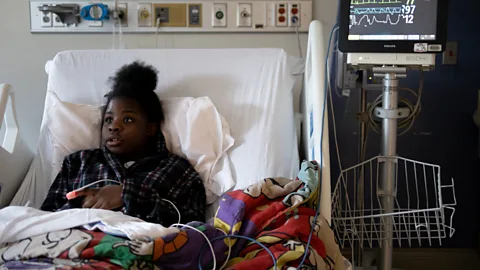 Reuters/Hannah Beier
Reuters/Hannah BeierPaediatricians running post-Covid clinics believe that the true prevalence lies in the region of 10%. Other scientists, however, point out that the data is clouded by the fact that more than half of children without Covid-19 have also suffered from headaches, fatigue, sleep disturbances and issues with concentration during the pandemic. Many surveys of persistent post-Covid symptoms in children do not compare children infected with Covid-19 with uninfected controls, which could lead to over-representation of symptom prevalence.
As such many scientists feel that there remains an ongoing need for more rigorous studies to accurately determine the true risk of long Covid, particularly in the wake of Omicron. And it is likely that as more children are vaccinated against Covid-19, the numbers affected will change.
For Buonsenso, whatever the true prevalence of long Covid across adolescents and younger children transpires to be, the sheer numbers being infected with the virus means significant numbers are suffering.
"Even if the long Covid prevalence turns out to be say 2%, given the hundreds of thousands of children who are get Covid, it is still a very massive number," he says.
Exactly why children develop long Covid symptoms is still a mystery too.
Oliveira told the BBC that in some cases children can sustain organ damage from the virus that causes Covid-19, Sars-CoV-2. It can invade the heart or the pancreas, causing conditions such as pericarditis or pancreatitis where that particular organ becomes inflamed – which can lead to breathing problems and other long-term complications, but this is relatively rare.
There are series of theories for why long Covid occurs in adults, ranging from the reactivation of a dormant virus, to lingering viral fragments within the body, to a viral-induced autoimmune reaction with so-called autoantibodies binding to cells in different tissues. The same may be true for children, but another idea being considered as a possible mechanism for long Covid in both children and adults is that the virus induces damage to the circulatory system.
"The hypothesis that is mostly talked about currently is inflammatory changes to small blood vessels that then will lead to organ dysfunction," says Jakob Armann, a paediatrician at Dresden University of Technology in Germany, who has been collecting blood samples from secondary school children to try to identify possible causes of long Covid. "But there is no reliable data in kids at the moment that proves this."
But Oliveira is not convinced that processes driving long Covid in children are always the same as in adults. For one thing, the symptom profiles are subtly different. Many adults experience brain fog and other neurological issues, symptoms which are thought to be driven in some cases by the presence of autoantibodies, antibodies which attack the body’s own tissue. However, Oliveira says that the dominant long Covid symptoms in children tend to be fatigue, headaches, dizziness, pain in muscles and joints.
"Let's say autoantibodies are the main driving cause of this disease, then those autoantibodies should be produced irrespective of age," he says. "So the prevalence of long Covid should then be the same at all ages. But we don't see that, the prevalence is lower in children."
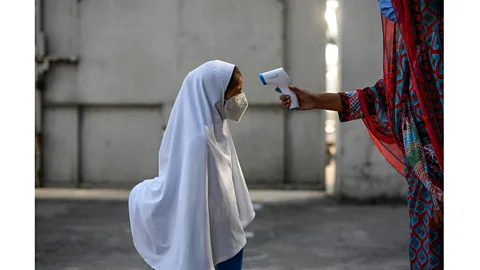 Aamir Qureshi/Getty Images
Aamir Qureshi/Getty ImagesInstead, Oliveira points to one study which found that young children who present to doctors with post-Covid inflammation tend to have a biomarker in their blood which is associated with a leaky gut – a digestive condition which can allow microbes from the gut to seep into the bloodstream. He suggests that while Covid-19 is predominantly a respiratory disease in adults, in a proportion of susceptible children it could be more of a gastrointestinal issue, with viral particles residing in the gut before getting reabsorbed into the blood and causing problems.
"We know that both kids and adults can shed the DNA of the virus in their stools for months and months, so it's a reasonable idea that getting re-exposed to dead virus due to a leaky gut will trigger a sudden inflammatory process," he says. "If this pans out to be true, then we can test infected children for a leaky gut and see if we can predict who's likely to have problems, which would be huge."
But just as in adults, there is likely to be more than one explanation. Buonsenso is currently collaborating with the Karolinska Institute to see whether children with long Covid seem to have any obvious genetic dysfunction. Daniel Munblit, a paediatrics specialist at Sechenov University in Moscow, Russia, has been investigating whether there is a connection between susceptibility to allergies and vulnerability to long Covid.
Over the past two decades, one of the main theories behind allergies has been an imbalance in the body's white blood cells, namely Th1 and Th2 cells. Th1 cells act as the first line of defence against external invaders, and generate inflammation in response to pathogens. Th2 cells are the second line response and produce antibodies.
In a well-functioning immune system, both groups of these cells work together to keep the system balanced. But in some susceptible individuals, one group becomes too dominant, which can lead to excessive reactions to a virus or other external stimulus, resulting in allergies and other autoimmune diseases. Munblit believes this could be one possible cause of post-Covid symptoms.
"We have found that children with a history of allergies are more prone to develop long Covid," he says. "But I'm approaching it with caution before we have more evidence because unfortunately parents tend to over-report allergic diseases in their children, so this requires more studies."
While the realisation long Covid can affect children has frightened parents around the world, Buonsenso is keen to reassure families that in the vast majority of cases, they recover within a few months, meaning that there is no long-term impact on their education and development.
There are cases of children, however, who remain ill more than six months after the initial infection. Specialists at the Schneider Children's Medical Center of Israel recently reported cases of children with long Covid going on to develop chronic problems such as asthma and hearing loss, and toddlers who have reverted in their development, going from walking back to crawling because of muscle pains.
"So far I'd say that between two-thirds and three-quarters of children with long Covid recover after three months, but there are a subset, around 10-20% that have not recovered spontaneously," Buonsenso says. "And we don't know yet if any of these children will go on to suffer longer term sequelae like we see with measles or other viral infections."
The National Institutes of Health have launched a study which will track up to 1,000 children and young adults who tested positive for Covid-19, and follow them for up to three years to investigate any long-term consequences on their health and quality of life.
Doctors are also investigating whether administering Covid-19 vaccines to children suffering from long Covid can help reduce the symptoms, as has been seen in adults. Oliveira says that this has proven to be a successful treatment approach with some children where there are still viral particles lingering somewhere in their body.
"The idea is that if there are remaining parts of the virus there, the vaccine may lead to clearing of them," he says. "I've had several kids who have had lingering symptoms, and not all of them have improved. But most of them have had either complete or partial resolution of their symptoms. I had one child who had severe abdominal pain for months, and other symptoms like headaches and fevers. And after they got the vaccine, their abdominal pain and headaches completely went away, but their fever remained. Two of the three symptoms going away, for me it's a victory."
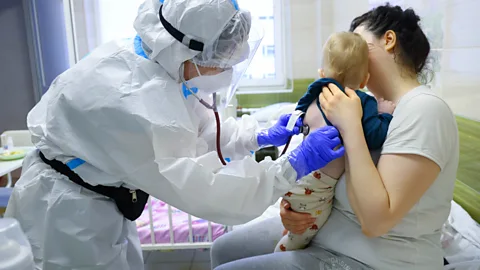 Peter Kovalev/TASS/Getty Images
Peter Kovalev/TASS/Getty ImagesApart from that, it remains a matter of trying to alleviate the problems as best as possible. Some symptoms such as dizzy spells can be treated with medications to reduce heart rate, while Oliveira refers children with chronic pain to cognitive behavioural specialists to try to help them find ways to cope with it.
Other specialists hope the increasing amounts of research being devoted to long Covid in children could help shed light on the long-term complications which can result from other childhood viral infections. It is known, for example, that RSV can lead to asthma, while influenza and the Epstein-Barr virus can also lead to chronic illness in a small proportion of children. Henry Balfour, a pediatrics specialist at the University of Minnesota Medical School believes that all of these post-viral conditions may stem from a similar weakness within the genetic code.
"I think all of these problems are related to various forms of immune dysregulation, that may have a common ancestor in our genes, and that's really worth looking into," says Balfour.
But for many parents such as Sammie McFarland, who founded Long Covid Kids after her 15-year-old daughter Kitty developed prolonged long Covid symptoms, it has been reassuring to see a greater number of policymakers and doctors taking the problem more seriously in recent months. In an interview with the BBC last year, McFarland says that when her daughter's illness was first described to a nurse, she was accused of attention seeking, and many other parents have been told that their child's problems are psychological.
"This has been a concern since the Royal College of Paediatrics and Child Health published an article stating families were reporting symptoms to GPs, with a discussion on fabricated illness," says McFarland. "Then there is the toxic positivity brigade who think that a positive approach will cure long Covid. While of course positivity plays an important role in any recovery, that doesn't cure damaged organs."
While long Covid may only affect a relatively small proportion of children, Buonsenso says that the numbers are still so substantial that the world cannot afford to ignore their plight.
"I know that in children it's less frequent but I think it's very difficult to close your eyes in front of so many patients reporting this," he says. "This is starting to create problems for national health systems, because it's very complicated and expensive to care for children with such multiple comorbidities. We have experienced a long-term problems in the past with Epstein-Barr and other viral infections, but the main difference now is that it's thousands and thousands of patients fighting to get their lives back on track."
* This article was updated on 7 March 2022 to reflect the latest estimates for long Covid from the UK's Office of National Statistics.
--
